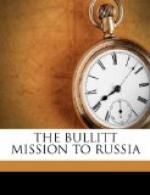The chairman. These orders came from the President?
Mr. Bullitt. These orders came to me from Col. House. I also discussed the matter with Mr. Lansing, and Mr. Lansing and Col. House gave me the instructions which I had.
Senator Knox. You said a moment ago that you went to Col. House to get a statement of the American position.
WHAT AMERICA WANTED
Mr. Bullitt. Yes; I asked Col. House these questions [reading]:
1. If the Bolsheviki
are ready to stop the forward movement
of their troops on all
fronts and to declare an armistice on
all fronts, would we
be willing to do likewise?
2. Is the American
Government prepared to insist that the
French, British, Italian,
and Japanese Governments shall
accept such an armistice
proposal?
3. If fighting is stopped on all fronts, is the Government of the United States prepared to insist on the reestablishment of economic relations with Russia, subject only to the equitable distribution among all classes of the population of supplies and food and essential commodities which may be sent to Russia?
In other words, a sort of Hoover Belgian distribution plan so that the Bolsheviki could not use the food we sent in there for propaganda purposes and to starve their enemies and to feed their friends.
The fourth question I asked him was as follows:
4. Is the United States Government, under these conditions, prepared to press the Allies for a joint statement that all Allied troops will be withdrawn from the soil of Russia as soon as practicable, on condition that the Bolsheviki give explicit assurances that there will be no retaliation against persons who have cooperated with the allied forces?
Col. House replied that we were prepared to.
Further, I asked Col. House whether it was necessary to get a flat and explicit assurance from the Soviet Government that they would make full payment of all their debts before we would make peace with them, and Col. House replied that it was not; that no such statement was necessary, however, that such a statement would be extremely desirable to have, inasmuch as much of the French opposition to making peace with the Soviet Government was on account of the money owed by Russia to France.
I further had an intimation of the British disposition toward Russia. As I said before, I had discussed the matter with Mr. Philip Kerr, and Sir Maurice Hankey and Col. House asked me to inform Mr. Kerr of my mission before I went. It was to be an entire secret from all except the British. The British and American delegations worked in very close touch throughout the conference, and there were practically no secrets that the American delegation had that were not also the property of the British delegation.




